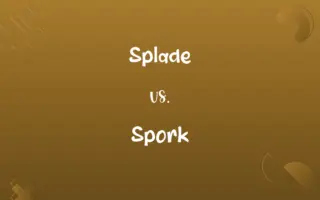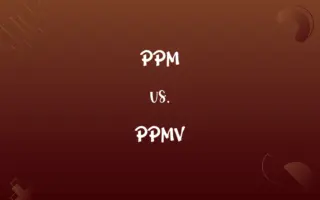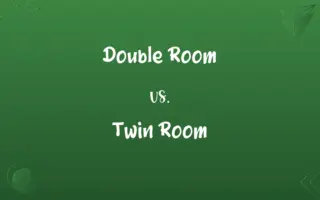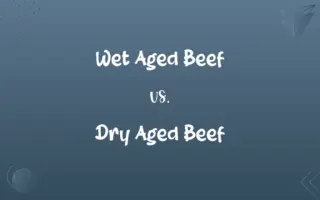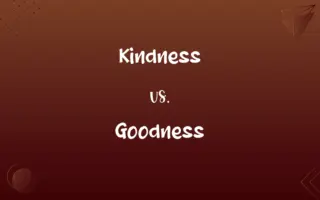Fungi vs. Fungus: Know the Difference

By Shumaila Saeed || Updated on December 25, 2023
"Fungi" is the plural form referring to more than one fungus, while "fungus" is a singular term describing a single organism in the fungi kingdom.
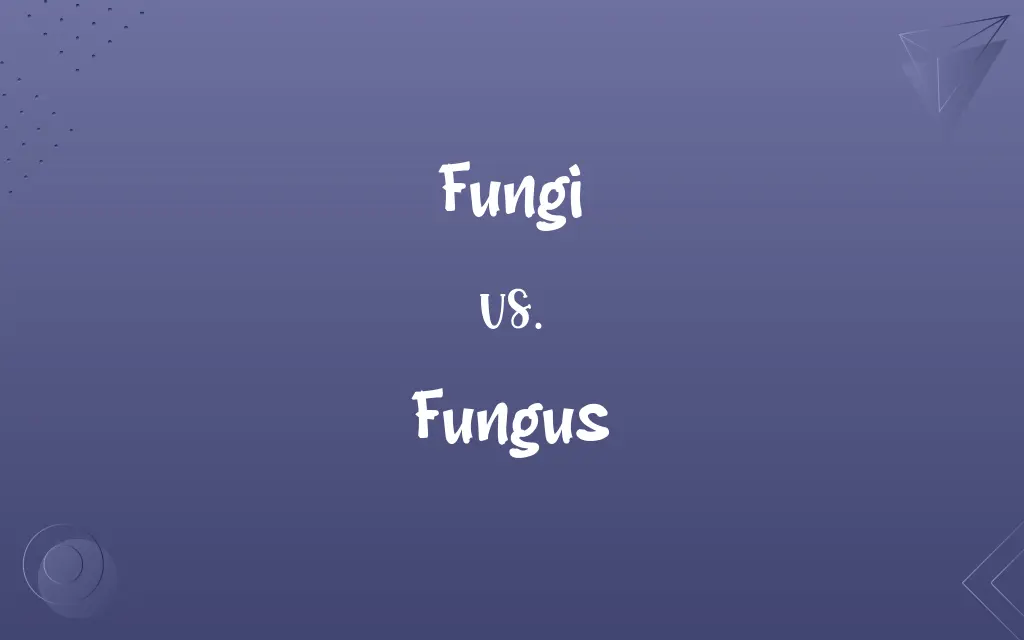
Key Differences
Fungi are a group of eukaryotic organisms that include microorganisms such as yeasts, molds, and mushrooms. These organisms play crucial roles in many ecosystems, decomposing matter and recycling nutrients. A fungus, on the other hand, refers to an individual member of this group, like a single mushroom or a mold growing on a piece of bread.
Shumaila Saeed
Dec 09, 2023
The term fungi encompasses a vast kingdom of organisms that share common characteristics such as the absence of chlorophyll and a unique cell wall structure. A single fungus represents one specific organism within this kingdom, displaying the unique traits that classify it as a fungus, such as its method of obtaining nutrients.
Shumaila Saeed
Dec 09, 2023
When discussing fungi, we often refer to their collective impact on the environment, agriculture, or medicine. For example, fungi play a role in the production of antibiotics. In contrast, when we talk about a fungus, we might describe its individual characteristics, such as the shape, size, or color of a mushroom.
Shumaila Saeed
Dec 09, 2023
Fungi as a group show a remarkable diversity in forms and functions, ranging from single-celled yeasts to complex mushrooms. Each fungus, however, has its specific life cycle, habitat preferences, and ecological niche, contributing to the diversity within the fungal kingdom.
Shumaila Saeed
Dec 09, 2023
The study of fungi, mycology, explores the complex relationships these organisms have with other living beings. Studying a single fungus involves understanding its role in its immediate environment, such as its symbiotic relationship with a plant or its pathogenic impact on humans.
Shumaila Saeed
Dec 09, 2023
ADVERTISEMENT
Comparison Chart
Context of Use
Discussing the group or kingdom
Describing an individual organism
Shumaila Saeed
Dec 09, 2023
Study Focus
Diversity, roles in ecosystems
Specific characteristics, life cycle
Shumaila Saeed
Dec 09, 2023
Linguistic Usage
Used to refer to multiple types or species
Used to refer to a specific instance or type
Shumaila Saeed
Dec 09, 2023
ADVERTISEMENT
Fungi and Fungus Definitions
Fungi
A kingdom of spore-producing organisms lacking chlorophyll.
Fungi like mushrooms and molds are essential decomposers in nature.
Shumaila Saeed
Dec 09, 2023
Fungus
An organism that feeds by absorbing nutrients from organic matter.
The fungus on the tree trunk helps decompose the wood.
Shumaila Saeed
Dec 09, 2023
Fungi
Eukaryotic organisms that include yeasts, molds, and mushrooms.
Fungi play a significant role in food production and medicine.
Shumaila Saeed
Dec 09, 2023
Fungus
A single organism of the fungi kingdom, such as mold or yeast.
This fungus growing on the bread is a type of mold.
Shumaila Saeed
Dec 09, 2023
Fungi
Organisms that obtain food by absorbing nutrients from their surroundings.
Fungi can be found in diverse habitats, from forests to human-made environments.
Shumaila Saeed
Dec 09, 2023
ADVERTISEMENT
Fungus
A single entity studied in mycology, displaying specific traits.
This particular fungus is being studied for its medicinal properties.
Shumaila Saeed
Dec 09, 2023
Fungi
A group known for their role in decomposition and nutrient cycling.
Fungi are critical in breaking down organic matter in ecosystems.
Shumaila Saeed
Dec 09, 2023
Fungus
A spore-producing eukaryotic organism without chlorophyll.
A fungus, like a mushroom, can be edible or poisonous.
Shumaila Saeed
Dec 09, 2023
Fungus
An individual member of the fungi kingdom, known for its role in ecological processes.
The fungus in the soil helps in nutrient cycling.
Shumaila Saeed
Dec 09, 2023
Fungi
(pathology) Spongy, abnormal growth, as granulation tissue formed in a wound.
Shumaila Saeed
Oct 19, 2023
Fungus
Any of numerous spore-producing eukaryotic organisms of the kingdom Fungi, which lack chlorophyll and vascular tissue and range in form from a single cell to a mass of branched filamentous hyphae that often produce specialized fruiting bodies. The kingdom includes the yeasts, smuts, rusts, mushrooms, and many molds, excluding the slime molds and the water molds.
Shumaila Saeed
Oct 19, 2023
Fungus
(mycology) Any member of the kingdom Fungi; a eukaryotic organism typically having chitin cell walls but no chlorophyll or plastids. Fungi may be unicellular or multicellular.
Shumaila Saeed
Oct 19, 2023
Fungi
A style of folk and popular music from the Virgin Islands, traditionally performed by bands consisting of banjo, guitar, ukulele, and washboard with various percussion instruments on rhythm.
Shumaila Saeed
Oct 19, 2023
Fungus
A spongy, abnormal excrescence, such as excessive granulation tissue formed in a wound.
Shumaila Saeed
Oct 19, 2023
Fungi
A group of thallophytic plant-like organisms of low organization, destitute of chlorophyll, in which reproduction is mainly accomplished by means of asexual spores, which are produced in a great variety of ways, though sexual reproduction is known to occur in certain Phycomycetes, or so-called algal fungi. They include the molds, mildews, rusts, smuts, mushrooms, toadstools, puff balls, and the allies of each. In the two-kingdom classification system they were classed with the plants, but in the modern five-kingdom classification, they are not classed as plants, but are classed in their own separate kingdom fungi, which includes the phyla Zygomycota (including simple fungi such as bread molds), Ascomycota (including the yeasts), Basidiomycota (including the mushrooms, smuts, and rusts), and Deuteromycota (the fungi imperfecti). Some of the forms, such as the yeasts, appear as single-celled microorganisms, but all of the fungi are are eukaryotic, thus distinguishing them from the prokaryotic microorganisms of the kingdon Monera.
Shumaila Saeed
Oct 19, 2023
Fungus
Any one of the Fungi, a large and very complex group of thallophytes of low organization, - the molds, mildews, rusts, smuts, mushrooms, toadstools, puff balls, and the allies of each. See fungi.
Shumaila Saeed
Oct 19, 2023
Fungus
A spongy, morbid growth or granulation in animal bodies, as the proud flesh of wounds.
Shumaila Saeed
Oct 19, 2023
Fungus
A parasitic plant lacking chlorophyll and leaves and true stems and roots and reproducing by spores
Shumaila Saeed
Oct 19, 2023
Fungi
Organisms studied in mycology, often characterized by their complex life cycles.
Fungi exhibit a fascinating array of forms, from microscopic yeasts to large mushrooms.
Shumaila Saeed
Dec 09, 2023
Repeatedly Asked Queries
What are fungi?
Fungi are a kingdom of organisms including molds, yeasts, and mushrooms.
Shumaila Saeed
Dec 09, 2023
Do fungi photosynthesize?
No, fungi do not photosynthesize; they absorb nutrients.
Shumaila Saeed
Dec 09, 2023
Is a fungus always multicellular?
No, some fungi, like yeasts, are unicellular.
Shumaila Saeed
Dec 09, 2023
Can fungi be multicellular?
Yes, many fungi, like mushrooms, are multicellular.
Shumaila Saeed
Dec 09, 2023
Do fungi reproduce sexually or asexually?
Fungi can reproduce both sexually and asexually.
Shumaila Saeed
Dec 09, 2023
Can fungi be found everywhere?
Yes, fungi are ubiquitous and found in many environments.
Shumaila Saeed
Dec 09, 2023
Can a fungus be beneficial?
Yes, some fungi are beneficial for decomposing organic matter or as food sources.
Shumaila Saeed
Dec 09, 2023
Are all fungi harmful?
No, while some can be harmful, many fungi are beneficial.
Shumaila Saeed
Dec 09, 2023
Are fungi important for the environment?
Yes, fungi play crucial roles in ecosystems, such as decomposition and nutrient cycling.
Shumaila Saeed
Dec 09, 2023
How does a fungus obtain nutrients?
A fungus absorbs nutrients from its environment.
Shumaila Saeed
Dec 09, 2023
Where can a fungus typically be found?
A fungus can be found in soil, water, air, and on living or dead organisms.
Shumaila Saeed
Dec 09, 2023
Can a fungus be used in medicine?
Yes, some fungi are sources of antibiotics and other medicinal compounds.
Shumaila Saeed
Dec 09, 2023
Is a fungus a type of plant?
No, a fungus is not a plant; it belongs to the fungi kingdom.
Shumaila Saeed
Dec 09, 2023
What is the ecological role of a single fungus?
A fungus can contribute to decomposition, symbiotic relationships, or disease.
Shumaila Saeed
Dec 09, 2023
Can a fungus be microscopic?
Yes, many fungi, like yeasts, are microscopic and not visible to the naked eye.
Shumaila Saeed
Dec 09, 2023
How does a single fungus reproduce?
A fungus can reproduce through spores, either sexually or asexually.
Shumaila Saeed
Dec 09, 2023
How do fungi affect human life?
Fungi impact human life in various ways, including food production, medicine, and disease.
Shumaila Saeed
Dec 09, 2023
Do all fungi form visible structures?
No, not all fungi form visible structures like mushrooms; some are microscopic.
Shumaila Saeed
Dec 09, 2023
Share this page
Link for your blog / website
HTML
Link to share via messenger
About Author
Written by
Shumaila SaeedShumaila Saeed, an expert content creator with 6 years of experience, specializes in distilling complex topics into easily digestible comparisons, shining a light on the nuances that both inform and educate readers with clarity and accuracy.
